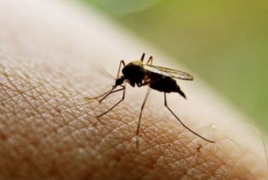
92 lab-confirmed cases of the West Nile virus have been recorded in Armenia as of August 30, the National Center for Disease Control and Prevention reports.
According to the Center, 17 cases of the virus were registered in the period between between August 24 and 30.
According to the World Health Organization, human infection of the West Nile virus is most often the result of bites from infected mosquitoes. Mosquitoes become infected when they feed on infected birds, which circulate the virus in their blood for a few days. The virus eventually gets into the mosquito's salivary glands. During later blood meals (when mosquitoes bite), the virus may be injected into humans and animals, where it can multiply and possibly cause illness. A very small proportion of human infections have occurred through organ transplant, blood transfusions and breast milk. There is one reported case of transplacental (mother-to-child) WNV transmission. To date, no human-to-human transmission of WNV through casual contact has been documented, and no transmission of WNV to health care workers has been reported when standard infection control precautions have been put in place.
The disease is caused by the West Nile Virus (WNV).

